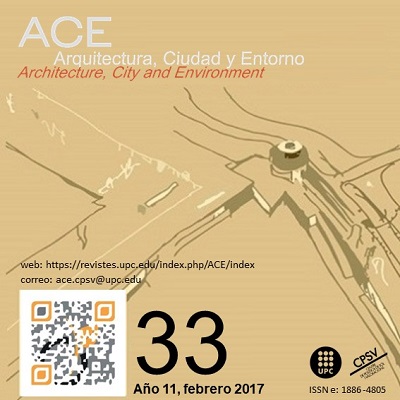Smaller towns and culture of complexity; problems, prospects, reuse trajectories
DOI:
https://doi.org/10.5821/ace.11.33.5157Keywords:
Historical town, territory, conservation, re-useAbstract
Smaller historic towns, conventionally defined by a population threshold of five thousand inhabitants, differ in history, urban quality, levels of autonomy or dependence on other settlements. Despite their relevance - they are home to 17% of the population over a territory corresponding to approximately 54% of our Country – only fairly recently they have achieved an important role in the institutional agenda.
This paper focuses on depopulation conditions, ageing and backwardness, poor employment and welfare opportunities, and, above all, "distance" from the most dynamic areas of the Peninsula, highlighting several scattered re-use and regeneration practices dealing with the built environment – either out of necessity or for holiday use - which has recently shown much greater resilience to seismic risk than new structures.
Still, the gap between propensity of the urban elite in a general re-appropriation of lifestyles evoked by the historic towns and the decay and often irreversible abandonment affecting most of them could not be greater.
As a matter of fact, being part both of urban planning and cultural heritage concerns, re-use and regeneration policies of such huge underused stock stand as imperative strategies, and conservation programming should meet both regional planning issues and urban renewal techniques.
Downloads
Published
Issue
Section
License
| INTELECTUAL PROTECTION CRITERIA |
At this moment, it is count with the "Oficina Española de Patentes y Marcas", while global protection it is being processed by the World Intelectual Property Organization (OMPI/WIPO). Nevertheless the International Standard Serial Number Office (ISSN) has given the following numbers ISSN: 1886-4805 (electronic version) and 1887-7052 (paper version). All articles will be peer reviewed, using double blind reviewing. |
| COPYRIGHT |
The article contents and their comments are authors exclusive liability, and do not reflect necessarily the journal editor commitee's opinion. All ACE published works are subject to the following licence CC BY-NC-ND 3.0 ES http://creativecommons.org/licenses/by-nc-nd/3.0/es/ It implies that authors do not hold nor retain the copyright without restrictions but only those included in the licence. |


































